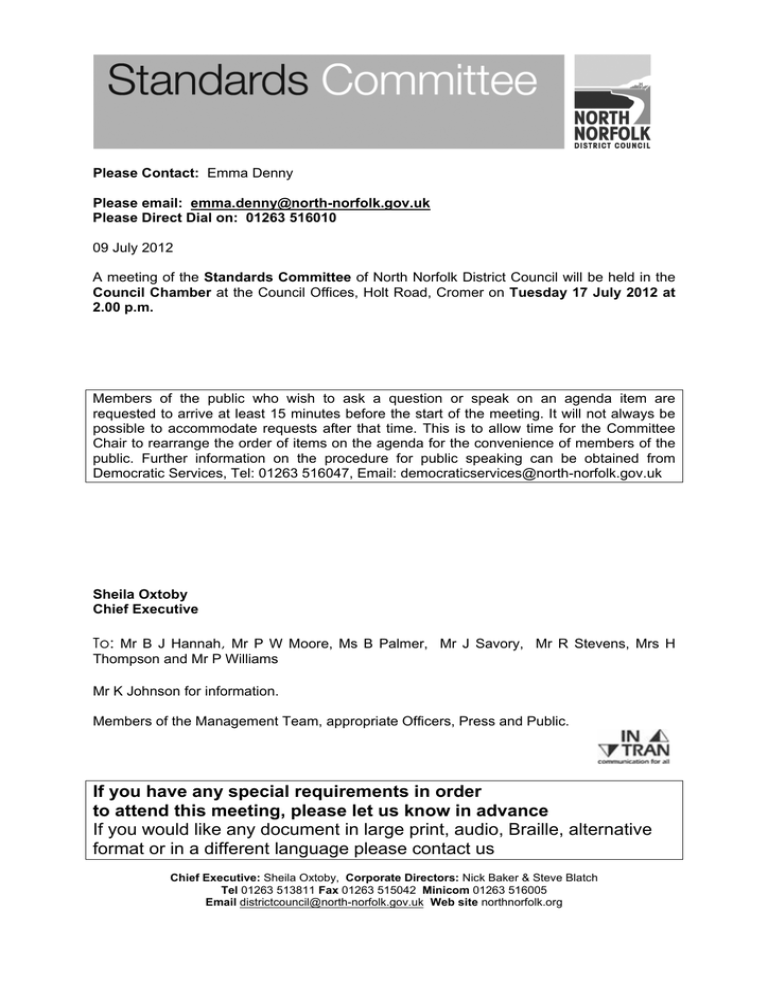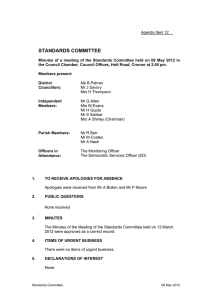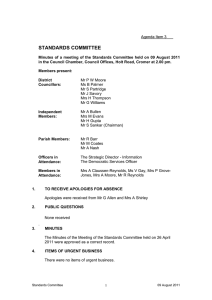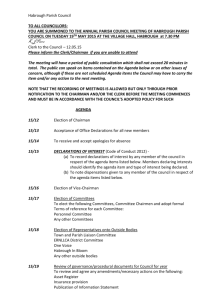Document 12928833
advertisement

Please Contact: Emma Denny Please email: emma.denny@north-norfolk.gov.uk Please Direct Dial on: 01263 516010 09 July 2012 A meeting of the Standards Committee of North Norfolk District Council will be held in the Council Chamber at the Council Offices, Holt Road, Cromer on Tuesday 17 July 2012 at 2.00 p.m. Members of the public who wish to ask a question or speak on an agenda item are requested to arrive at least 15 minutes before the start of the meeting. It will not always be possible to accommodate requests after that time. This is to allow time for the Committee Chair to rearrange the order of items on the agenda for the convenience of members of the public. Further information on the procedure for public speaking can be obtained from Democratic Services, Tel: 01263 516047, Email: democraticservices@north-norfolk.gov.uk Sheila Oxtoby Chief Executive To: Mr B J Hannah, Mr P W Moore, Ms B Palmer, Mr J Savory, Mr R Stevens, Mrs H Thompson and Mr P Williams Mr K Johnson for information. Members of the Management Team, appropriate Officers, Press and Public. If you have any special requirements in order to attend this meeting, please let us know in advance If you would like any document in large print, audio, Braille, alternative format or in a different language please contact us Chief Executive: Sheila Oxtoby, Corporate Directors: Nick Baker & Steve Blatch Tel 01263 513811 Fax 01263 515042 Minicom 01263 516005 Email districtcouncil@north-norfolk.gov.uk Web site northnorfolk.org AGENDA 1. TO RECEIVE APOLOGIES FOR ABSENCE 2. APPOINTMENT OF CHAIRMAN AND VICE-CHAIRMAN As this is the first meeting of the Standards Committee under the new regime, Members are requested to elect a Chairman AND Vice-Chairman for the ensuing year. 3. PUBLIC QUESTIONS 4. MINUTES (attached – p. 1) To approve as correct records, the minutes of the meeting of the Committee held on 08 May 2012 and the minutes of the hearing held on 26 June 2012. 5. ITEMS OF URGENT BUSINESS To determine any items of business which the Chairman decides should be considered as a matter of urgency pursuant to Section 100B (4) (b) of the Local Government Act 1972. 6. CO-OPTED MEMBERS To confirm the appointment of co-opted Members to the Committee for the ensuing year. 7. DECLARATIONS OF INTEREST Members are asked at this stage to declare any interests that they may have in any of the following items on the agenda. The Code of Conduct for Members requires that declarations include the nature of the interest and whether it is a pecuniary interest. 8. PARISH AND DISTRICT MEMBERS’ REGISTER OF INTERESTS AND OFFICER REGISTER OF GIFTS AND HOSPITALITY The Parish and District Members’ Register of Interests and Officer Register of Gifts and Hospitality are available for inspection in the Legal Section. 9. NEW STANDARDS REGIME To provide an oral update on the new Standards regime. 10. MONITORING OFFICER ANNUAL REPORT 2011 – 2012 (attached – p.8 ) To receive the Monitoring Officer Annual Report 2011 – 2012 (Source: Tony Ing, Contact David Johnson (Interim Monitoring Officer) david.johnson@norfolk.gov.uk) 11. EXCLUSION OF PRESS AND PUBLIC To pass the following resolution: “That under Section 100A(4) of the Local Government Act 1972 the press and public be excluded from the meeting for the following items of business on the grounds that they involve the likely disclosure of exempt information as defined in paragraphs 1 and 3 of Part I of Schedule 12A (as amended) to the Act” 12. LOCAL ASSESSMENT FRAMEWORK CASES (attached – p.18) NOT FOR PUBLICATION – Information contained in the report is exempt under Regulation 8(6) of the Standards Committee (England) Regulations 2008 Summary: Recommendations: Cabinet member(s): Wards Affected: This report advises Members of complaints received by the Monitoring Officer, the type of breaches alleged and the status of the matters. Members are asked to note the contents of the report. All All Agenda Item 4 STANDARDS COMMITTEE Minutes of a meeting of the Standards Committee held on 08 May 2012 in the Council Chamber, Council Offices, Holt Road, Cromer at 2.00 pm. Members present: District Councillors: Ms B Palmer Mr J Savory Mrs H Thompson Independent Members: Mrs M Evans Mr H Gupta Mr S Sankar Mrs A Shirley (Chairman) Parish Members: Mr R Barr Mr M Coates Mr A Nash Officers in Attendance: The Monitoring Officer The Democratic Services Officer (ED) 1. TO RECEIVE APOLOGIES FOR ABSENCE Apologies were received from Mr A Bullen and Mr P Moore 2. PUBLIC QUESTIONS None received . 3. MINUTES The Minutes of the Meeting of the Standards Committee held on 13 March 2012 were approved as a correct record. 4. ITEMS OF URGENT BUSINESS There were no items of urgent business. 5. DECLARATIONS OF INTEREST None Standards Committee 1 08 May 2012 6. PARISH AND DISTRICT MEMBERS’ REGISTER OF INTERESTS AND OFFICER REGISTER OF GIFTS AND HOSPITALITY The Registers were open to display and were available for inspection in the Legal Services area. 7. NEW STANDARDS REGIME PROPOSED ARRANGEMENTS The Monitoring Officer updated the Committee on the outcome of a recent meeting of Norfolk Monitoring Officers which had been convened to consider how to manage the process of introducing the new Standards regime arrangements. There had also been discussion around achieving a consensus on the Code of Conduct to enable a consistent approach across the County. It was agreed that an outline report would be drafted and each authority would be consulted to see if agreement could be reached on key areas. The Monitoring officer explained that no formal decision was required. He felt that the Standards Committee was the best forum to consider the proposals and express preferences before a final decision would be taken by Full Council. He briefly outlined the proposed arrangements: a) The adoption of the Code of Conduct, together with the guidance for Members. Two Codes of Conduct had been submitted – one from the Local Government Association and one from the Department for Communities and Local Government. At a recent meeting of Council Leaders, a preference had been expressed for the DCLG version. Monitoring Officers favoured the LGA Code. b) The establishment of arrangements for dealing with standards allegations and the establishment of a Standards Committee. c) The Appointment of an Independent Person and reserve Independent Persons. Monitoring Officers had recognised that there could be problems with recruitment for this post and it was proposed that there was a ‘pool’ of Independent persons formed that could include current Independent Members of Standards Committees across Norfolk. Although existing Independent Members could not be retained by their current Standards Committee, they would under this proposal, be able to be appointed to another Standards Committee within the region. d) The establishment of a register of interests to be kept and maintained by the monitoring officer and to contain those matters set out in Appendix 3 until such time as the Secretary of State publishes regulations relating to ‘disclosable pecuniary interests’ when the Authority may be asked to consider new proposals and changes to standing orders in relation to the registration and declaration of interests. e) The delegation of dispensation powers under section 33 of the Act to the Standards Committee and the designation of the monitoring officer as Proper Officer for the receipt of applications for dispensations. f) The adoption of such other changes to the Authority’s Constitution as are necessitated by the changes outlined above. g) The delegation to the Monitoring Officer of the power to take all steps and deal with all such ancillary matters as are required to implement any of the above and to render the council compliant with the Act. Standards Committee 2 08 May 2012 Members discussed the outline report: 1. It seemed that the principles of the new arrangements were the same as the existing regime. The only change seemed to be in the processes involved. The Monitoring Officer agreed. He said that the seven principles of public life remained an integral part of the new Standards regime. It was hoped that difficulties in the way complaints were handled could be avoided in the future and that it was imperative that practice notes were issued to explain to complainants that some issues were not covered and to deal with any unrealistic expectations. 2. There was a concern that the current system had been put in place to ensure that complaints were dealt with independently at a local level and that a move back to self-regulation could be viewed negatively by the public. The Monitoring Officer agreed this was a risk. It was hoped that concerns regarding self-regulation could be addressed with the appointment of an ‘Independent Person’. In addition, it may be necessary to review the Monitoring Officer protocol to ensure that it reflected the member Code of Conduct. 3. The role of the Independent Person could prove to be onerous given the large number of complaints made to the current Standards Committee. The Monitoring Officer said that using a ‘pool’ of Independent Persons could help with this. In response to a further concern that vexatious complaints should be dealt with early on, he said that the issuing of practice notes could assist with this. 4. There was a possibility that the Standards Committee could be viewed as powerless without the option to use sanctions when dealing with complaints. The Monitoring Officer explained that any complaints referred to the Committee for a Hearing would be serious rather than trivial. In addition, for County and District Councils more focus would be placed on Group Leaders to support the Committee’s decisions and ensure compliance with them. 5. In response to a concern that any future Standards Committee could be dominated by one political party, the Monitoring Officer said that there was also the option to co-opt town and parish councillors onto the Committee. 6. Mrs H Thompson, a District Councillor and County Councillor updated the Committee on a recent meeting at the County Council to consider the Outline report. She said that they had agreed to accept the LGA Code of Conduct but that they intended to alter some of the wording. The Monitoring Officer added that this was an advantage to the Code being dealt with locally. 7. At the request of a Member, the Monitoring Officer explained that the current Standards Committee would be retained until the final regulations were implemented. The anticipated date was currently 1st July 2012. 8. There was a concern that the role of Monitoring Officer could be reduced in the future and could eventually become a shared resource between local authorities. The Monitoring Officer said that currently it was a statutory requirement that each authority must have a monitoring officer but there could be a change in how the role was discharged at some point. The Chairman asked the Committee to consider the proposals before them in turn: Standards Committee 3 08 May 2012 a) A new Code of Conduct It was agreed that the Local Government Association Code of Conduct was the preferred option. b) Retention of a Standards Committee The Monitoring Officer advised Members that if there was no Standards Committee in place Hearings would have to be considered by another committee of the Council. It was agreed that a Standards Committee should be retained and that parish and town councillors should be co-opted onto the committee. c) Recruitment of Independent Members The Committee agreed to support the proposal for a pooled arrangement for Independent Persons. One Member abstained. d) Registration of Interests The Committee agreed to continue with the existing arrangements until the publication of regulations relating to ‘disclosable pecuniary interests’. 8. LOCAL ASSESSMENT FRAMEWORK CASES The Monitoring Officer updated the Committee on the status of complaints received. The meeting concluded at 15.20 pm ___________ Chairman Standards Committee 4 08 May 2012 STANDARDS COMMITTEE Minutes of a meeting of the Standards Committee Hearing held on 26 June 2011 in the Council Chamber, Council Offices, Holt Road, Cromer at 2.00 pm. Members present: Independent Member: Mrs M Evans (Chairman) District Councillor: Mr P W Moore Parish Member: Mr A Nash Officers in Attendance: The Legal Adviser and the Democratic Services Officer. Investigating Officer: John Chinnery, Solicitor 1 APOLOGIES None 2 ITEMS OF URGENT BUSINESS None 3 DECLARATIONS OF INTEREST None 4 CODE OF CONDUCT COMPLAINT REFERENCE NO 136 NORTH NORFOLK DISTRICT COUNCIL The Subject Member was present. The Complainant was not present. The Chairman introduced the Panel and explained that the Complainant had made three allegations which were investigated by the Investigating Officer, John Chinnery. He had found a breach on the third allegation only. At the Standards Committee meeting on 7th February 2012 the Committee considered the Investigating Officer’s report and accepted that there had been no breach in regard to the first two allegations and that part of the complaint was dismissed at that time. The Hearing Panel would therefore only be considering the third allegation. The Legal Adviser then outlined the third allegation of the complaint: “The Subject Member failed to update his Register of Members’ Interests form to include his appointment as a member of the North Norfolk Business Forum made on 18 May 2011” Standards Committee Hearing 1 5 26 June 2012 The finding of the Investigating Officer was that there had been a breach of the Code by the Subject Member for failure to register his new appointment to the NNBF within 28 days. The Legal Adviser explained that registrable interests were outlined in Paragraph 8 of the Code of Conduct. The Chairman asked the Subject Member if he wished to respond to the allegation. The Subject Member said that he believed he had kept his register of interests up to date. He acknowledged that he had been overwhelmed by the amount of paperwork that was provided to all newly elected members. He said that if he had been aware of any omission he would have corrected it immediately The Subject Member also said that he did not realise that the Chairman of the North Norfolk Business Forum was the Managing Director of the company that was the subject of a planning application that he had spoken in favour of. He added that it would be helpful if all Members were reminded to update their register of interests each time they were appointed to an outside body. The Committee asked the Subject Member questions: 1. The issue of training was raised and whether the Subject Member had received any guidance on the registering of interests. He said that the week following his election was hectic and there was a lot of information to take in. There was just one piece of written guidance relating to the registration of interests. He added that he had sought legal advice on whether his appointment to the NNBF was a registrable interest and had received conflicting advice from two senior officers. 2. In response to a question regarding training provided by the Development Committee, the Subject Member said that he was a substitute on the committee and had no recollection of the declaration of interests at meetings being covered in the training. He added that the training was over a year ago. 3. The Subject Member was asked about the general induction programme for newly elected councillors. He confirmed that it did not include conduct at meetings and agreed that this would be a useful addition to any future induction programme. 4. The Chairman raised the Subject Member’s role as Chairman of Erpingham Parish Council and whether he had received any training. He said that he had not. In response to a further question as to whether he had received any advice on acting as a substitute at the Development Committee, he confirmed that had not received any guidance. However, he stressed that he was only asked to act as a substitute 2 days before the meeting, by which time he had missed the scheduled site meeting. The Committee retired at 2.4 0pm to consider the complaint and reach a decision. They returned at 3.00pm and the Chairman read out the following statement: “The Committee carefully considered the report and the oral evidence in coming to their decision as to whether there had been a breach of the Code of Conduct, and in particular a breach of paragraph 13(2). Standards Committee Hearing 2 6 26 June 2012 It was not in dispute that Councillor Smith was appointed to the executive of the North Norfolk Business Forum on 18th May 2011. Neither was it in dispute that he did not register this as an interest within 28 days of this date. The Members found Councillor Smith’s connection with the North Norfolk Business Forum was a registrable interest and the Committee considered this with regard to paragraph 8(1)(a) of the Code of Conduct. In particular the Committee found that it was a registrable interest under paragraph 8(1)(a)(i) and (iv), having been appointed by the Council The Committee found that this Business Forum did exercise functions of a public nature and was therefore registrable. This was clear from the overall and key aims set out in the North Norfolk Business Forum (NNBF) Strategy and Action Plan. Finding of failure The Committee found that the Subject Member breached the provisions of the Code of Conduct paragraph 13(2) by failing to update his Register of Members’ Interests form in writing within 28 days of his appointment to the executive of the North Norfolk Business Forum. Sanctions imposed In deciding what, if any, sanction to impose, the Committee considered: • • • The Subject Member was a new Member having no previous experience in such a role The Committee regarded the failure to update the Register as a technical breach arising from a simple mistake at a time, where, as a new Member, he had a lot of new matters and procedures to deal with. The Subject Member experienced no personal gain and rectified the mistake when it came to his notice. The Committee considered these to be very strong mitigating factors and therefore decided to take no action in regard to the breach” The matter being concluded, the Hearing ended at 3.05 pm. Standards Committee Hearing 3 7 26 June 2012 Agenda Item 10 Monitoring Officer Annual Report 2011/12 Section Numbers Contents 1 Introduction 2 The Monitoring Officer’s Work April 2011 – March 2012 3 Key Messages 4 Looking Forward 5 Overall opinion on the adequacy and effectiveness of the Governance framework Appendix 1 List of procurement exemption requests between 1 April 2011 and 31 March 2012 Monitoring Officer Annual Report 2011/12 8 1. Introduction 1.1 The Monitoring Officer’s Annual Report summarises the more important matters arising from the Monitoring Officer’s work for the District Council from 1 April 2011 to 31 March 2012 and comments on other current issues. 1.2 Corporate Governance is the system by which local authorities direct and control their functions and relate to their communities. It is founded on the fundamental principles of openness, integrity and accountability together with the overarching concept of leadership. In this respect, North Norfolk District Council recognises the need for sound corporate governance arrangements and over the years has put in place policies, systems and procedures designed to achieve this. 1.3 The Monitoring Officer is appointed under Section 5 of the Local Government and Housing Act 1989 and has a number of statutory functions in addition to those conferred under the Local Government Act 2000 and subsequent regulations governing local investigations into Member conduct. These are outlined in the next section of the report. 2. The Monitoring Officer’s Work April 2011 – March 2012 2.1 The Monitoring Officer has undertaken the following work during the year from April 2011 to March 2012. Duties (a) Report on contraventions or likely contraventions of any enactment or rule of law. (b) (c) Work undertaken There has been one breach of the Data Protection Act. A voluntary disclosure was made to the Information Commissioner’s Office who decided no regulatory action was needed on this occasion. There have been no such reportable incidents. Report any maladministration or injustice where the Ombudsman has carried out an investigation. Establish and maintain the Register of Member’s interests and gifts and hospitality. Members have been trained in the provisions of the new Code and have been issued with Guidance. The Register of Members Interests is publicised on the internet and Members have been reminded about their obligations through the Members’ Bulletin and after the election in May 2011. The Registers remain as a standing item on the Standards Committee Agenda and are available for Members or members of the public to inspect. Monitoring Officer Annual Report 2011/12 9 Duties d) Maintain Register of Employees gifts and hospitality and declaration of officer’s interests in contract. Work undertaken The Registers have been updated regularly and are open to inspection. (e) During the year between April 2011 and March 2012 a total of 36 complaints have been received, compared with 29 in 2010/11 and 53 in 2009/10. Investigate misconduct in respect of District, Parish and Town Councillors under the Code of Conduct. These have all been assessed in accordance with the time limits of the local assessment framework During that time there have been 12 cases where no further action was considered necessary by the Assessment Sub-Committee, compared with 9 in 2010/11 and 30 in 2009/10. 8 Cases were referred for investigation (13 in 2010/11) and 16 were referred for other action (3 in 2010/11). Of the 8 referred for investigation, 1 was found to have breached the Code of Conduct, 2 were found to have no breach and 5 were outstanding at 31 March 2012. Of the 36 complaints received, 7 relate to District Councillors and 29 relate to Town or Parish Councillors. Members have regularly sought advice in order to comply with the Code of Conduct, particularly in relation to declaring interests under the Code. (f) Investigate breaches of the Council’s own protocols. There have been no alleged breaches of the Council’s own protocols. (g) Provide advice to Town and Parish Councils on the interpretation of the Code of Conduct. The Monitoring Officer and his staff have provided advice to Parish Councils on the Code of Conduct during 2011/12 face to face, by letter, telephone and email. Staff attended Parish Council meetings to give training and support to Parish Councils as identified by the Standards Committee to implement programmes of “other action” and also where Town and Parish Councils have requested such support and it was appropriate to do so. Monitoring Officer Annual Report 2011/12 10 Duties (h) Promote and support high standards of conduct through support to the Standards Committee. Work undertaken The Standards Committee have received reports on a range of matters during 2011/12 including; • The future of Standards for England and the Local Assessment Framework. • Regular reporting of outstanding cases. • Reports requested by the Committee. • Progress of other action. • Impact of, and issues arising from, the Localism Act 2011. The Standards Committee has been programmed to meet on a bi-monthly basis with reserve dates for alternate months. During the year to 31 March 2012, the Standards Committee actually met on 6 occasions. (i) Liaison with Standards for England. The Monitoring Officer and his staff liaised with Standards for England (until its abolition in January 2012) on the following matters; • Individual cases. • Interpretation of the Code. • Parish Council matters. • Performance complaints (j) Compensation for maladministration. None. (k) Maintenance and review of the Constitution. The Constitution Working Party was set up by Full Council on 22 February 2012 to undertake the annual review of the Constitution and to develop a work programme for 2012/13. Amendments from the annual review were formally adopted by the Council at its meeting on 18 April 2012. (l) Responsibility for complaints made under the Council’s Whistleblowing and Anti-Fraud policies. There have been no complaints made under the Whistleblowing and Anti-Fraud policies. (m) Breaches of the Employee Code of Conduct. There have been no formal allegations of breaches under the Employee Code of Conduct. Monitoring Officer Annual Report 2011/12 11 Duties (n) Advice on vires issues, maladministration, financial impropriety, probity and policy framework. Work undertaken The Monitoring Officer or his senior staff have been consulted on new policy proposals and on matters, which have potentially significant legal implications. The Monitoring Officer and his staff attend Cabinet, Full Council and other Committees as necessary. The report template has been updated this year but continues to require authors to forward reports to the Monitoring Officer for review of the legal implications prior to submission for agendas where appropriate or to explain why this has not been necessary. There has been an improvement in the number of reports that are consulted upon in a timely fashion. The Monitoring Officer and his senior staff regularly advise on the legality and/or appropriateness of administrative procedures, in conjunction with the Democratic Services Team. 3. Key Messages 3.1 The key messages to note from the year are: (i) There has been one significant incident arising during the year between April 2011 and March 2012 and this relates to an accidental release of personal data. A voluntary disclosure was made to the Information Commissioner’s Office (ICO) explaining the circumstances of the incident and the action the Council took to recover the situation. The ICO was satisfied with the action the Council took and the measures put in place to prevent a recurrence. The ICO decided that no regulatory action was required in this instance. However, should there be any further incidents the ICO may not take the same view. One consequence is that Members and Officers will need to be reminded about their duties and responsibilities under the Data Protection Act. (ii) The systems of internal control administered by the Monitoring Officer including compliance with the Council’s Constitution were adequate and effective during the period for the purposes of the latest Regulations. However, it is important that Members and Officers are regularly reminded of their obligations and updated on any changes to ensure there is no complacency. Monitoring Officer Annual Report 2011/12 12 (iii) During 2011/12, one audit was undertaken of relevance to the Standards Committee and the work of the Monitoring Officer. The review focused on Corporate Governance arrangements, specifically identifying issues in relation to Committee terms of reference, Committee reporting and Member training and development. The recommendations included the need to make amendments to the Constitution as part of the annual review and a programme of review to be conducted throughout the year. In response to this recommendation, the Council established a Constitution Working Party which has taken on this agenda. The audit opinion for this review was that the Council’s arrangements provide adequate assurance. (iv) Following the annual review of the Constitution, there will be a significant number of updates and amendments that will be required to reflect, amongst other matters, the impact of the Localism Act 2011 and the management restructuring. The Constitution Working Party will recommend updates and amendments at various times during the year when relevant decisions are made or regulations issued. It will be necessary to brief Members and Officers on the key updates and amendments to the Constitution. (v) The Council is proactive in raising the standards of ethical conduct among Members and staff and has put in place arrangements for monitoring compliance with standards of conduct across the Council. In common with previous years those arrangements include: • Standards of conduct and behaviour for Officers. • A Code of Conduct for Members. • A Register of Interests. • Register of Gifts and Hospitality. • The provision of advice on governance matters to Town and Parish Councils. • Arrangements to receive and investigate allegations of breaches of proper standards of financial conduct and fraud and corruption. • Arrangements to ensure the quality of the Legal Service provided. • Regular reports to the Standards Committee and ad hoc reports on major legislative and governance issues are provided to the Corporate Leadership Team. 4. Looking Forward 4.1 The key issues for 2012/13 are as follows; 4.2 Code of Conduct 4.2.1 As reported above, the Council has received 36 complaints between April 2011 and March 2012 and will continue to advise the Standards Committee Monitoring Officer Annual Report 2011/12 13 on the number and type of complaints received under both the current arrangements and new arrangements (when they come into effect). 4.2.2 Under the provisions of the Localism Act 2011, the Register of Members’ Interests will continue to be administered and updated by the Monitoring Officer. When the new requirements come into effect it will be necessary for all councillors to complete amended register forms and for the Council to publish the register entries on its website for the District, Town and Parish Councils. Where a Town or Parish Council has its own website, it will also be necessary for that Town or Parish Council to publish its register entries there. 4.2.3 In addition, all Councils will have to adopt a new Code of Conduct that incorporates the principles of conduct in public life and appoint an Independent Person as a point of reference for the Council and Monitoring Officer in dealing with complaints under the adopted Code of Conduct. The Council is due to consider a new Code of Conduct at its meeting on 30 May 2012. Once adopted, it will be necessary for the Monitoring Officer to engage with Town and Parish Councils about adopting their own Codes and explaining the associated complaints procedures. It is currently expected the new arrangements will be implemented on 1 July 2012. 4.2.4 Given these imminent changes, and subject to the Council confirming it wishes to maintain a Standards Committee under the new provisions, meetings will remain scheduled to take place on a bi-monthly basis during 2012/13 with reserve dates set for intervening months. 4.3 Corporate Governance Framework 4.3.1 The Council will keep the Code of Corporate Governance under review, taking into account any revisions to associated guidance and any recommendations arising from audit reports. 4.3.2 The Monitoring Officer will continue to provide an assurance in respect of the Code and the Annual Governance Statement by way of this Annual Report. 4.4 Constitution and Regulations 4.4.1 Following the annual review of the Constitution by the Constitution Working Party, amendments have been made as agreed at Full council on 18 April 2012. The Constitution Working Party will have an on-going role and responsibility for the foreseeable future and has established a programme of work for the remainder of 2012/13. 4.4.2 As part of those amendments, a new provision was included within the contract procedure rules requiring the publication of details of the procurement exemptions approved during the year in the Monitoring Officer Annual Report. Details are attached at Appendix 1. 4.4.3 It will be appropriate to continue to remind Members and staff of the importance of compliance with the Council’s regulations, as set out in the Constitution and other policy framework documents, and the Monitoring Officer and his staff will give advice accordingly. Monitoring Officer Annual Report 2011/12 14 5. Overall opinion on the adequacy and effectiveness of the Governance framework 5.1 That the systems of internal control administered by the Monitoring Officer including the Code of Conduct and the Council’s Constitution, were adequate and effective during the year between April 2011 and March 2012 for the purposes of the latest regulations (subject to the areas outlined above). …………………………………. Tony Ing Monitoring Officer 9 May 2011 Monitoring Officer Annual Report 2011/12 15 APPENDIX 1 List of procurement exemption requests between 1 April 2011 and 31 March 2012 Section 9 of the Council’s Contract Procedure Rules deals with exemptions as it is acknowledged that the market place or extenuating circumstances does not always allow for the normal procedures to be followed. Where exemptions have been approved there is a requirement for these to be reported as part of the Monitoring Officer’s Annual Report in line with the Council’s Constitution and Contract Standing Orders (9.2, pg 9.33). Service Description Legal Services Procurement of legal case management system Procurement of £7,394 website development for the Norfolk Climate Change Taskforce £28,815 Installation of a prefabricated public convenience unit in North Walsham (actual unit provided free of charge) Environmental Strategy Coast & Community Partnership Estimated Exemption Value over Applied contract life £25,315 9.1 (a) Contact Officer Emma Duncan 9.1 (c) Peter Lumb 9.1 (a) Rob Young Exceptions (9.2) It is acknowledged that the market place or extenuating circumstances do not always allow the full procurement procedures to be followed. Subject to compliance at all times with European procurement rules, contracts can also be entered into in the following circumstances: (a)For the supply of goods or services where there is only one supplier and no acceptable alternative, following consultation with the Procurement Officer. (b) For the extension, addition to or maintenance of existing buildings, works plant or equipment, where the Cabinet has decided that this can only be done satisfactorily by the original supplier. (c) As part of a consortium (where the Council is not the lead authority). (d) A contract that has been tendered by a central government body (the Office of Government Commerce) or Framework contracts such as the Eastern Shires Purchasing Organisation (ESPO). (e) Where there is an urgent Health and Safety requirement, subject to the prior approval of the Council’s Health and Safety Officer and the relevant Director. (f) Where the Cabinet considers it desirable on commercial grounds to accept a quotation from a supplier already engaged by the Council on a project provided that Monitoring Officer Annual Report 2011/12 16 further services have a connection with the original project and that the price is not more than 50% of the original contract sum. (g) For loans arrangements. (h) On behalf of another authority where the agency agreement provides that the procurement rules of that authority are to be followed. Further information can be requested from Duncan Ellis, Procurement Officer on ext 6330 or via email: Duncan.ellis@north-norfolk.gov.uk Monitoring Officer Annual Report 2011/12 17






